Houses for Sale in Abruzzo Italy Your Complete Guide
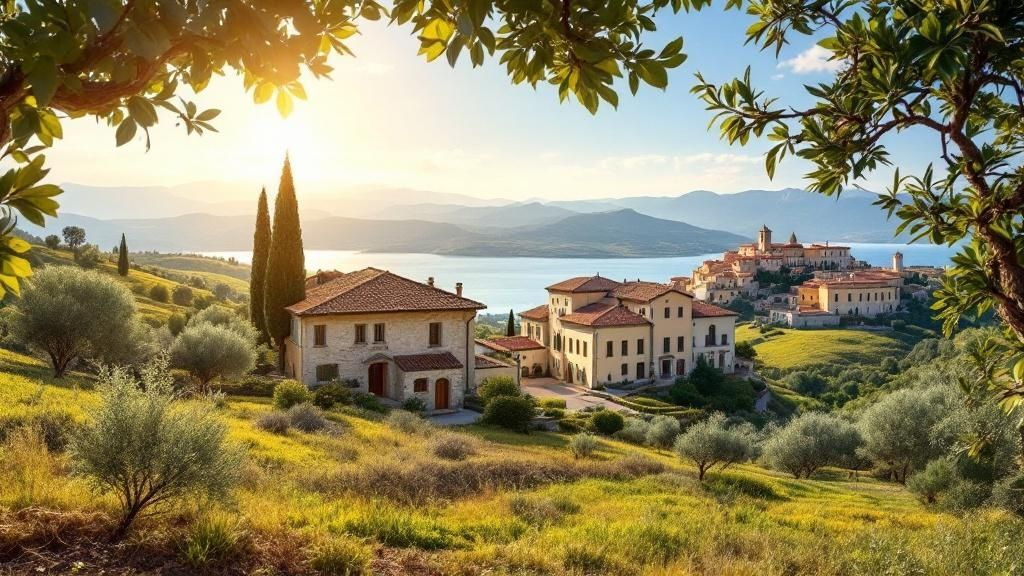
Picture this: you wake up, pull back the curtains, and are greeted by rolling green hills dotted with ancient olive groves, with the sparkling Adriatic Sea shimmering in the distance. This isn't just a fantasy; it's the everyday reality for people who discover houses for sale in Abruzzo Italy. This special part of Italy offers a rare combination of affordability, authentic culture, and stunning natural beauty that you just won't find in the more crowded tourist hotspots.
Why Abruzzo Is Your Ideal Italian Escape
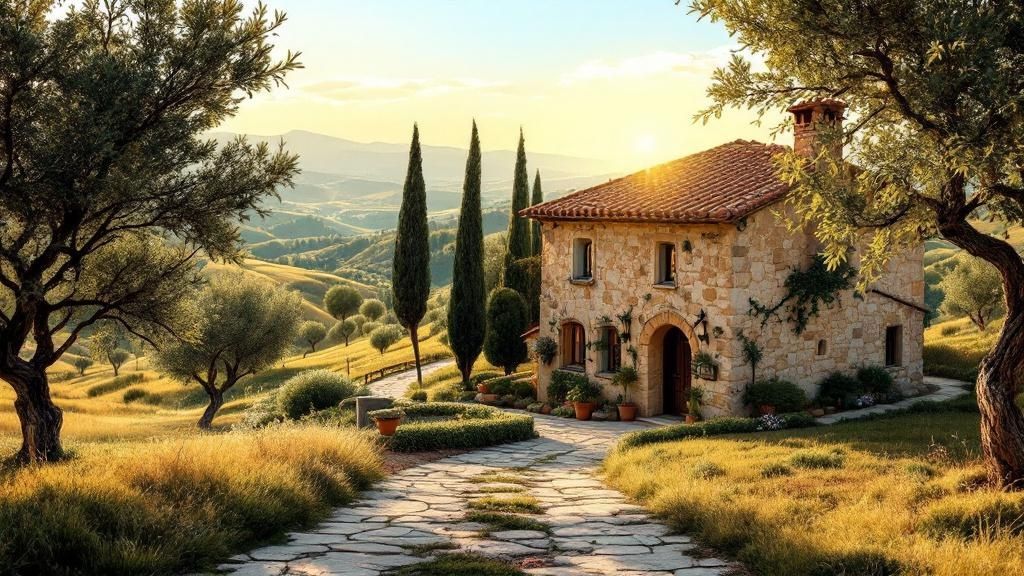
For those in the know, especially international buyers, Abruzzo is Italy's best-kept secret. It’s like finding a small, family-owned vineyard that produces incredible wine but without the flashy price tag. While busloads of tourists head to Tuscany or the Amalfi Coast, a growing number of people are choosing Abruzzo for an experience that feels more real and a whole lot less commercial.
Life here just moves at a different rhythm. The region is often called "the green heart of Europe" for a good reason—nearly a third of its land is dedicated to national parks and protected nature reserves. This deep-rooted commitment to preservation gives rise to an incredible quality of life, where serene landscapes and vibrant, historic towns coexist beautifully.
A Lifestyle of Authenticity and Value
Choosing a home in Abruzzo is about more than just bricks and mortar; it’s about embracing a lifestyle full of simple pleasures and rich traditions. It’s about taking a morning walk through a medieval hilltop village, sitting down for a plate of fresh pasta at a local family-run trattoria, and knowing that both pristine beaches and rugged mountains are just a short drive away. This seamless blend of nature and culture is what truly defines the region.
This appeal is also backed by solid market trends. The Italian residential property market as a whole has been showing strong signs of recovery. In fact, transactions jumped by 11.2% in the first half of the year, with buyers feeling more confident as the economy stabilizes. While prices in major cities have started to climb, the Abruzzo market remains a stable and affordable entry point. This makes buying property here a genuinely sound long-term move. You can dive deeper into Italy's property market outlook on idealista.it to see what this means for buyers.
For many, purchasing a home in Abruzzo isn't just a financial transaction; it's an investment in a different way of life—one that prioritizes tranquility, community, and a deep connection to the land.
What Makes Abruzzo Unique
So, what really sets this region apart from other beautiful spots in Italy? It boils down to a mix of things you can see and feel, all of which make a powerful case for settling down here.
- Unspoiled Natural Beauty: The geographical diversity is simply incredible. You have the Adriatic's unique Trabocchi Coast on one side and the soaring peaks of the Gran Sasso and Maiella national parks on the other.
- Authentic Italian Culture: Abruzzo has held onto its centuries-old traditions, festivals, and food heritage, offering a truly immersive cultural experience that hasn't been watered down.
- Strategic Location: While it can feel like a world away from the hustle, Abruzzo is surprisingly well-connected. Pescara has an international airport, and the rail links make traveling around Italy and beyond a breeze.
- Affordability: This is a big one. Both the cost of living and property prices are significantly lower than in Italy's more famous regions, meaning your money goes a lot further.
This unique combination makes the search for houses for sale in Abruzzo, Italy, feel less like a property hunt and more like the first exciting step toward a richer, more balanced way of life.
Getting to Know the Abruzzo Property Market
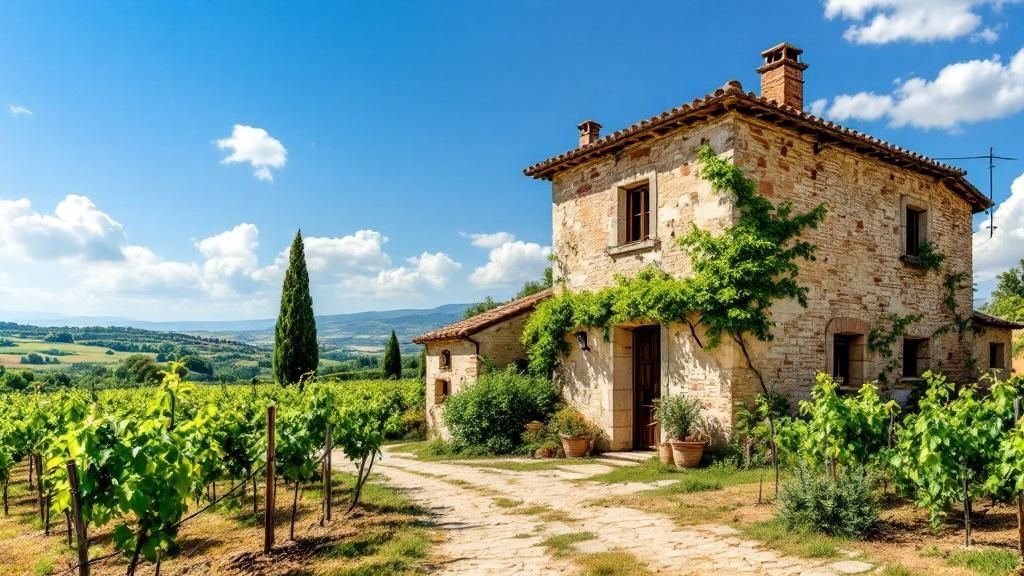
Jumping into the Abruzzo real estate market doesn't require an advanced degree in economics. It's less like trying to time a volatile stock market and more like wading into a calm, steady river. What you'll find here is remarkable stability, incredible value, and a welcome break from the wild price surges you see in Italy's more tourist-heavy regions.
This predictability makes searching for houses for sale in Abruzzo Italy a much less stressful endeavor. You can actually plan your budget with a good degree of certainty. The real trick is to get comfortable with the numbers and understand what's behind them. Once you do, your property hunt shifts from a hopeful guess into a smart, informed strategy.
What Do Houses Actually Cost? Price Trends and Averages
So, let's talk numbers. The defining feature of the Abruzzo property market is its affordability, especially when you hold it up against Italy's major cities. To give you a clear snapshot of the current landscape, let's look at some recent data.
Here's a quick overview of where things stand.
Abruzzo Property Market Snapshot (Mid-Year)
This table provides a clear overview of average property prices in Abruzzo, showing recent trends and comparing sale prices with rental costs.
| Metric | Value (June) | Year-Over-Year Change |
|---|---|---|
| Average Sale Price | €1,362 / m² | -0.73% |
| Average Rental Price | €9.11 / m² per month | +12.61% |
The average asking price for homes for sale recently sat at €1,362 per square meter. That figure has barely budged, dipping just 0.73% from the previous year. This isn't a market of frantic bidding wars; it's a picture of stability. For a deeper dive into these numbers, you can always explore the latest data on the Abruzzo property market at immobiliare.it.
What this really means is that you can find amazing value, whether you're dreaming of a small apartment or a rambling country estate. To give you some context, prices in Italy's big-name cities can easily shoot past €4,000 per square meter, which makes Abruzzo’s appeal crystal clear. This affordability is a massive draw for international buyers and a key reason we feature Italy in our guide to the best countries to buy property.
The real bargain in Abruzzo isn't just the sticker price. It's the incredible quality of life you get for your money. You're not just buying square meters; you're investing in panoramic views, authentic culture, and a genuine sense of peace.
What Drives Property Prices in Abruzzo?
While the regional average is a useful benchmark, prices can vary quite a bit from one town to the next. If you understand what influences these prices, you can zero in on the best opportunities for your budget.
- Coastal Proximity: It's no surprise that properties along the Adriatic, especially on the beautiful Trabocchi Coast, are more expensive. That sea view and easy beach access come at a premium.
- Mountain Views: In the same way, homes with clear, sweeping views of the Gran Sasso or Maiella mountain ranges are highly sought after and command higher prices.
- Condition of the Property: A fully restored, move-in-ready home will cost more upfront than a rustico (a traditional country house) needing a total overhaul. But for the right person, these renovation projects are a golden opportunity to create a custom home for a fraction of the finished cost.
- Access and Amenities: You'll generally find higher prices in and around the larger towns like Pescara, Chieti, and L'Aquila, which offer better transport links, more shops, and a wider range of services.
Thinking through these factors will help you refine your search. For example, if a sea view is a must-have, you'll need to set your budget accordingly. But if you’re happy with a short drive to the coast and don’t mind a bit of renovation work, you can uncover some absolute gems in the region’s enchanting hilltop villages. This kind of insight turns you into a savvy buyer, ready to spot a great deal and make a purchase that's not just a dream home, but a smart investment too.
Finding Your Perfect Town in Abruzzo
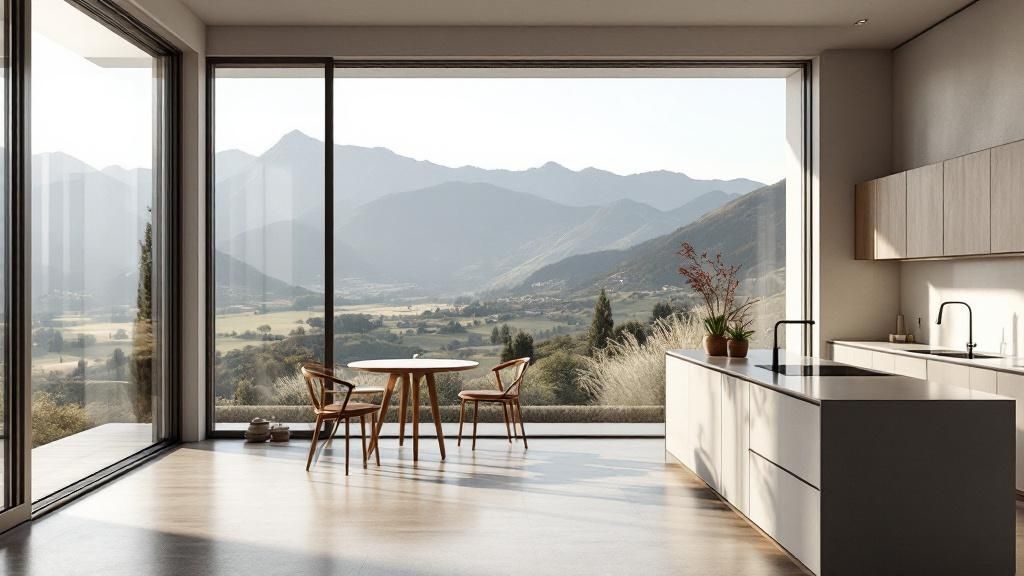
Choosing where to look for houses for sale in Abruzzo isn't just about picking a spot on a map. It’s about finding the community where you’ll truly feel at home. Abruzzo’s landscape is so diverse that your entire lifestyle can shift within just a short drive. Are you someone who needs to hear the waves, or do you prefer the quiet majesty of the mountains? Perhaps the lively hum of a historic town is more your speed.
Think of this as your personal tour of the region's distinct personalities. We'll explore what makes each area unique to help you match a location to the Italian life you're dreaming of. This isn't just a list of towns; it's a starting point for envisioning where your own story in Italy can begin.
Coastal Gems for Sun and Sea Lovers
For anyone dreaming of salty air and sandy shores, the Adriatic coast is the natural place to start. The coastline stretches for over 130 kilometers, serving up everything from bustling beach resorts to the one-of-a-kind Trabocchi Coast. This unique stretch is famous for its trabocchi—historic wooden fishing platforms that jut out over the sea. Many have been cleverly converted into some of the most incredible seafood restaurants you'll ever visit.
- Vasto: A gorgeous town perched on a hilltop overlooking the sea, Vasto gives you the best of both worlds: history and beach life. Its historic center is brimming with character, while the marina below boasts a wide, sandy beach perfect for relaxing.
- The Trabocchi Coast: This area, especially between Ortona and Vasto, is ideal if you’re looking for a more dramatic and authentic coastal setting. Properties here often come with breathtaking sea views and a much quieter pace of life than the larger resort towns.
Historic Hilltop Towns Steeped in Culture
If your vision of Italy involves winding cobblestone streets, ancient stone houses, and panoramic views that seem to go on forever, then Abruzzo's hilltop towns are calling your name. Sprinkled throughout the provinces of Chieti, Pescara, and Teramo, these villages are the true heart of the region.
Here, life moves to a different rhythm. The local community is the center of everything, and you're far more likely to find a weekly market than a big supermarket. It’s an authentic experience that feels a world away from modern pressures.
Towns like Penne and Loreto Aprutino are perfect examples. They are treasure troves of history, art, and architecture, offering beautifully preserved palazzi (townhouses) and apartments that are often surprisingly affordable. These spots are perfect for culture lovers and anyone who wants to dive headfirst into traditional Italian life.
Mountain Retreats for Nature Enthusiasts
If you feel most alive surrounded by nature, the areas around Abruzzo’s magnificent national parks offer an incredible lifestyle. The region is home to three national parks—Gran Sasso and Monti della Laga, Maiella, and the National Park of Abruzzo, Lazio, and Molise. These protected areas are a paradise for hiking, skiing, and wildlife spotting.
When you search for houses for sale in Abruzzo Italy near the mountains, you’ll find a mix of properties, from rustic stone cottages (rustici) crying out for restoration to modern ski chalets. Towns like Pescasseroli or Scanno act as gateways to these natural wonders, providing a tranquil base with easy access to endless outdoor adventure.
It's worth noting that while the national market has seen positive trends, Italy saw a general slowdown in house prices between December and February. Some northern regions had significant drops, while places like Molise and Tuscany saw more moderate declines. Although specific data for Abruzzo wasn’t highlighted in this report, its position between volatile and steady markets suggests it likely experienced minor price corrections, fitting in with the country's broader housing cycle. You can get a better feel for these nationwide trends by checking out this report on Italian property values on idealista.it.
The Four Provincial Capitals
Finally, don’t overlook Abruzzo's four provincial capitals. Each one serves as a convenient hub with its own distinct character, offering a great balance of amenities and authentic living.
- Pescara: The most modern of the four, with an international airport, great shopping, and a vibrant beach scene.
- Chieti: A historic city split into two parts—the ancient hilltop town (Chieti Alta) and the modern commercial hub below.
- L'Aquila: The regional capital, set against the stunning backdrop of the Gran Sasso mountains and currently undergoing a remarkable rebirth.
- Teramo: A charming city tucked between the mountains and the sea, known for its rich history and outstanding local food.
These cities offer more services and better transport links, making them a practical choice if you want the best of both worlds. By exploring these different types of locations, you can start to narrow down your search and move from a vague idea to a clear vision of your new home in Abruzzo.
A Buyer's Guide to Abruzzo Property Types
When you start looking for houses for sale in Abruzzo Italy, you’ll quickly realize you’re not dealing with a one-size-fits-all market. It’s more like wandering through a bustling Italian food market – each stall offers something unique and full of character. To find your perfect spot, you first need to understand what’s on offer, from a sleek, modern apartment by the sea to a centuries-old farmhouse just waiting for someone to bring it back to life.
Your personal vision and budget will ultimately lead the way, but getting a handle on the local lingo for property types is the first crucial step. Let's break down the most common homes you'll come across, so you can line up your Italian dream with what’s actually on the ground.
From Turnkey Apartments to Historic Townhouses
For anyone who just wants to land in Italy and dive straight into la dolce vita, an apartment or townhouse is a fantastic, hassle-free option. You’ll usually find these nestled within towns and villages, placing you right in the middle of a welcoming community.
- Appartamento (Apartment): These can be anything from brand-new builds on the Adriatic coast to charming flats inside a historic palazzo. They're a brilliant choice for a low-maintenance holiday home or for anyone who loves the convenience of town living.
- Palazzetto (Townhouse): Think of a palazzetto as a small, elegant townhouse, often spread over several floors and packed with historic details like original tilework or even frescoes. It’s like owning your own little slice of Italian history, and they are very common in Abruzzo's medieval town centers.
- Casa Indipendente (Detached House): These are standalone homes, either within a town or just on the outskirts. They give you a bit more privacy and usually come with a small garden or a private courtyard.
Many of these properties are ready to move into, which is a massive bonus for buyers who aren't looking for a big project. For people mapping out the best places to retire in Europe, this kind of simplicity can be exactly what they need to avoid the stress of a major renovation.
The Charm of Rural and Restoration Properties
For a lot of international buyers, the real magic of Abruzzo is found out in the countryside. This is where you'll discover properties that are absolutely brimming with character, offering you the chance to create a home that is uniquely yours. The opportunity to restore an old stone building is a huge part of the appeal, letting you perfectly blend old-world charm with modern comforts.
This image, taken from a popular property website, shows a typical country house near Vasto that needs renovation. It’s a great example of how even a modest-looking building is presented as an incredible opportunity, often for a very attractive price, to create a dream home with land and views.
The most rewarding finds in Abruzzo are often not the polished, finished homes, but the ones that whisper of history and potential. A rustico isn't just a ruin; it's a blank canvas for your Italian dream.
The two main types of rural properties you'll run into are:
- Casale (Farmhouse): This is usually a larger, more substantial stone building that was once the heart of a working farm. A casale often comes with a good chunk of land—perfect for planting gardens, olive groves, or even putting in a pool.
- Rustico (Country Home/Ruin): This is a broad term that can mean anything from a small, simple country cottage to a stone ruin that needs a total rebuild. These are the ultimate project properties, offering incredible value for your money but requiring a clear vision and a healthy renovation budget.
Building from Scratch on Your Own Land
Finally, if you have a very specific dream in mind, there's always the option of buying your own plot of land (terreno) and building a custom home from the ground up. Abruzzo has a good supply of building plots (terreno edificabile), many with absolutely stunning sea or mountain views.
Going this route gives you complete creative freedom, but it does mean you’ll have to navigate the local planning permissions and building regulations. It's absolutely essential to partner with a qualified geometra (a unique Italian role that's part surveyor, part project manager) right from the start. They’ll ensure your plans are realistic and compliant. While it’s certainly more complex, the end result is a home built just for you, in one of Italy’s most beautiful and authentic regions.
How to Navigate the Italian Property Buying Process
So, you're dreaming of buying a house in Abruzzo. It's an exciting thought, but the Italian property process can feel a bit intimidating from the outside, full of unfamiliar terms and steps.
Don't let that worry you. The best way to think about it is like a well-rehearsed play where everyone—the agent, the surveyor, the notary—has a specific role to perform. The whole system is quite logical and, importantly, it’s built to protect both you and the seller every step of the way. Once you understand the key milestones and who does what, you’ll be able to move forward with confidence. What seems complicated at first will quickly become a clear path to getting the keys to your new Italian home.
Let's break down the journey into its three main phases, from the initial hunt to the final handshake.
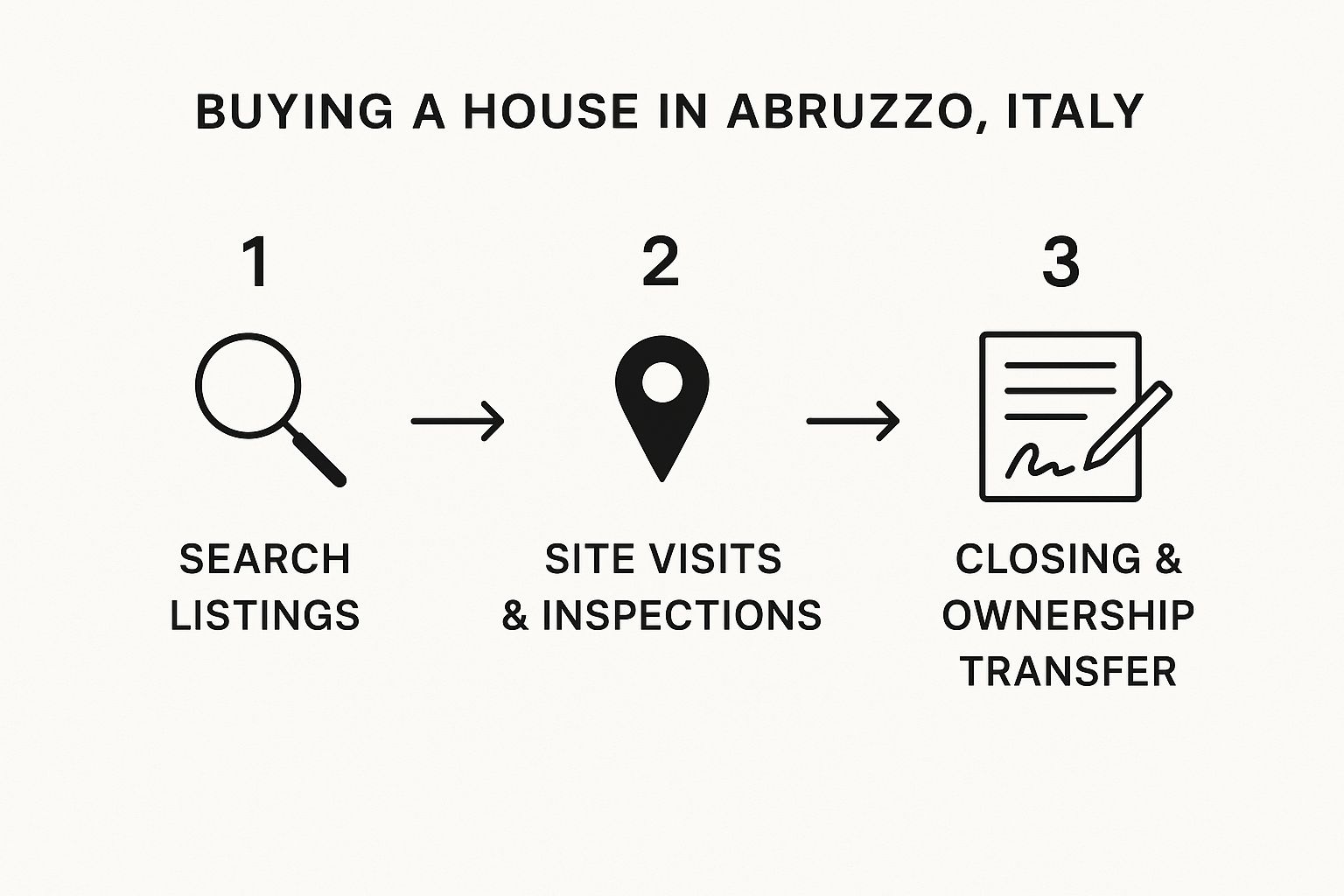
As you can see, it's a logical flow. A successful purchase really comes down to doing your homework, getting a thorough on-the-ground evaluation, and making sure the closing is legally watertight.
Your Professional Team in Italy
You definitely won't be going it alone. In fact, trying to would be a mistake. A good team of professionals is your secret weapon for a smooth, stress-free purchase. Here’s a quick rundown of who’s who.
- Agente Immobiliare (Real Estate Agent): Think of this person as your guide on the ground. They’ll help you find properties that fit your brief and handle the back-and-forth with the seller. A legitimate agent must be licensed and have a company registration code (R.E.A.), so be sure to check.
- Notaio (Notary): The Notaio is a neutral, state-appointed official who is the star of the show at the final closing. Their job isn’t to give you personal legal advice but to ensure the entire transaction is legal, all taxes are paid, and ownership is transferred correctly. They act as the impartial referee for both sides.
- Geometra (Surveyor): A geometra is absolutely essential, especially if you're looking at an older country house or a property with land. They perform a deep dive, conducting a technical survey to confirm the property’s physical state matches its legal plans, checking for unpermitted renovations, and verifying property boundaries. They're your eyes and ears for the technical stuff.
The Key Steps to Buying Your Abruzzo Home
The Italian buying process follows a clear three-act structure. Each step logically builds on the last, solidifying the deal and getting you closer to picking up the keys.
-
Proposta d'Acquisto (The Purchase Offer): You’ve found the one! The first formal step is to make a written offer. This document lays out the price you're offering and any conditions you might have (like the sale being contingent on a survey). You'll typically include a small deposit to show you’re serious. Once the seller signs it, it’s a legally binding agreement.
-
Compromesso (The Preliminary Contract): This is where things get serious. The compromesso is a much more detailed contract that locks in the deal. It includes all the final terms, a closing date, and details from the property's legal documents. When you sign this, you'll pay a substantial deposit, usually between 10% and 30% of the purchase price. This step gives you powerful legal protection—if the seller backs out after signing, they are legally required to pay you back double your deposit.
-
Rogito (The Final Deed): This is the grand finale. The rogito takes place at the notary’s office with everyone present: you, the seller, and the agents. The notary will read the final deed of sale aloud, everyone signs, and you transfer the remaining balance. At that moment, the keys are officially yours. Congratulations, you now own a home in Italy!
One of the very first things you need to do is get your codice fiscale. This is your personal Italian tax identification number. You can't do anything without it—not buy property, not open a bank account, not even set up utilities. You can apply for one at an Italian consulate in your home country or at the local tax office (Agenzia delle Entrate) once you're in Italy.
This structured process is all about transparency and security. For a more detailed breakdown, our complete guide on buying a house in Italy goes into even greater depth. By getting familiar with these stages and the experts who will help you, your search for a house in Abruzzo will feel less like a daunting task and more like the exciting adventure it should be.
Your Questions About Buying in Abruzzo, Answered
Alright, so you've explored the charming towns, seen the types of properties available, and even have a handle on the legal side of things. But there are always those practical, nitty-gritty questions that pop up right when you start to get serious. It's completely normal. Venturing into the Italian real estate market can feel a bit like learning a new dance, but once you know the steps, you can move forward with confidence.
Let's walk through some of the most common questions we hear from international buyers looking at houses for sale in Abruzzo, Italy. Think of this as the final piece of the puzzle—the practical stuff that turns a beautiful dream into a smart, well-executed plan.
What Are the Hidden Costs and Taxes?
This is probably the biggest source of anxiety for any buyer: the dreaded hidden costs. The good news is, they aren't really hidden—you just need to know what they are and plan for them. A solid rule of thumb is to budget an extra 10% to 15% of the property’s purchase price to cover all the taxes and closing costs.
Here’s a breakdown of where that money goes:
- Registry Tax (Imposta di Registro): This is the main tax on the sale. If you're buying a resale home from a private owner and it will be your main residence, the tax is just 2% of the property's cadastral value (which is a government-assessed value, often much lower than what you paid). If it’s a second home, that rate jumps to 9%.
- VAT (IVA): You only pay this if you're buying a brand-new home from a developer. Instead of the Registry Tax, you'll pay VAT at 10% of the purchase price, or a reduced rate of 4% if it's your primary home.
- Notary Fee (Parcella Notarile): The notary is a neutral, state-appointed official who makes the sale legal. Their fee is regulated and usually falls between 1% and 2.5% of the property's value. This covers all their work verifying documents, drafting the final deed, and officially registering the sale.
- Agency Commission (Provvigione): Your real estate agent's commission is typically around 3% to 4% of the sale price, plus VAT. Sometimes this is split between the buyer and seller, but it's common for the buyer to cover it. Always clarify this upfront.
Budgeting for these items from day one means no nasty surprises at the finish line, just a smooth and happy closing.
Can I Get a Mortgage in Italy as a Non-Resident?
Yes, you absolutely can! It’s a common misconception that it's impossible. However, you need to be prepared for a process that’s a bit more thorough than what you might be used to back home. Italian banks are naturally more cautious with international borrowers.
The biggest difference you'll find is the down payment. While an Italian resident might get a mortgage for 80% of the home's value, as a non-resident, you'll likely be asked for a larger deposit, often in the 40% to 50% range.
To get started, you’ll need to pull together a fair bit of paperwork. We’re talking detailed proof of income, your tax returns from home, and a credit report. The best advice is to start talking to Italian banks or a mortgage broker early. This way, you’ll know exactly what they need and can get a feel for what you can get pre-approved for.
How Much Should I Budget for Renovations?
Ah, the million-euro question! This is especially relevant for anyone who's fallen for the romantic idea of restoring a classic stone rustico or an old farmhouse. The honest answer is: it varies wildly.
The final bill really depends on two things: the building's current state and the quality of finishes you're dreaming of. Here’s a rough guide to get you started:
- Basic Renovation: Let's say the property is structurally sound but needs a full update—new wiring, plumbing, windows, and all the cosmetic touches. For this, you could budget anywhere from €800 to €1,200 per square meter.
- Full Structural Restoration: If you're looking at a property that needs the works—a new roof, foundation work, or rebuilding walls—the costs can easily climb to €1,500 per square meter and beyond, especially for high-end finishes.
Before you even think about making an offer on a project house, your first and most important investment should be hiring a good geometra (a technical surveyor). They will conduct a detailed structural survey (perizia) that gives you a realistic, expert opinion on what needs doing and how much it will cost. This report is your shield against buying a money pit.
Do I Need to Speak Italian to Buy Property?
While you don't legally have to be fluent, knowing some Italian will make your life a thousand times easier and more fun. Think about chatting with local builders, ordering coffee in the village bar, or just becoming part of your new community—a little language goes a long way.
For the actual buying process, however, it is absolutely essential to work with bilingual professionals. You have to understand every single word of every document you sign. Luckily, many real estate agents, lawyers, and notaries in Abruzzo are well-versed in working with international clients and offer services in English.
If your Italian isn't up to scratch, Italian law protects you. The final deed of sale (rogito) must be legally translated, or you can grant power of attorney to a trusted, bilingual representative. The key is to build a team you can communicate with clearly. It’s the cornerstone of a successful and stress-free purchase.
Ready to turn your Italian dream into reality? At Residaro, we connect buyers with beautiful properties across Europe's most stunning regions. Explore our curated selection of villas, farmhouses, and apartments to find your perfect home in Italy. Start your search today by visiting Residaro.